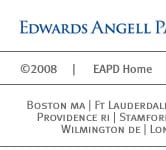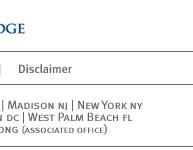
Litigation News
A decade after Lord Woolf shook up the legal system in an attempt to address the perceived prohibitive cost of litigation, the Master of the Rolls, Sir Anthony Clarke, has appointed Lord Justice Rupert Jackson to carry out a year long review into litigation funding.
Far from being an interim progress report, it appears that this is to be an all encompassing look at what we have and what alternatives are out there. Consideration is expected to be given to the abolishment of the current cost shifting practice in favour of something closer to the American model, the use of contingency or conditional fees, the availability of after-the-event insurance and third party funding. While the last of these has become something of a hot topic in its own right, with a perceptible increase in third party funders over the last year (last year saw the establishment of brokerage firms specializing in putting together claimants and potential funders), it will be interesting to see whether this mini boom will ease off significantly in the difficult economic climate.
Nevertheless, despite some misgivings in some quarters, the review and reviewer are overall being warmly welcomed.
Lehman Brothers Creditors Meet in London
On Friday, 14 November, row upon row of suits gathered at the O2 arena, a place usually reserved for more festive occasions. The gloomy occasion was the first creditors' meeting held by the administrators of Lehman Brothers, PriceWaterhouseCoopers (PwC). Over 1,000 creditors attended and if any of them were under any delusion that they would be receiving positive news, the message from the lead administrator Tony Lomas was bleak but clear: PwC's task is "ten times as big and as complicated" as the unwinding of Enron. PwC are still working on the Enron administration seven years after its collapse.
Creditors hoping to retrieve their assets or money in the near future had their hopes firmly dashed, as PwC explained that they would not be handing back money until they had carried out a very detailed examination of each claim in each asset class. PWC are trying to unravel a complex web of tens of thousands of trades that amount to more than US$1 trillion and the process is painstaking and slow. Furthermore, with the threat of litigation and pressure from a number of creditors, PwC will be extra careful to ensure that they cannot be criticised in relation to the prioritisation and the amount of the allocation of funds to the various creditors. At least 100 creditors have applied for "hardship" status, as the collapse of Lehman Brothers has left them perilously close to bankruptcy, which if granted will expedite their claims to their assets.
It is expected that the administration of Lehman Brothers will produce a number of claims in the British courts, probably by creditors anxious to retrieve their money, unhappy about the allocation they have given or blaming others for their loss.
In August the Office of Fair Trading announced that, after a two year investigation into price fixing in the aviation industry, it had charged four individuals for offences under the Enterprise Act. The individuals, who all worked for British Airways, were charged with having dishonestly agreed with others to make or implement arrangements which directly or indirectly fixed the price for the supply in the United Kingdom of passenger air transport services by British Airways and Virgin Atlantic Airways.
The Enterprise Act, which criminalises cartel activity (namely price-fixing, limiting supply or production, market-sharing and bid-rigging) has been in force since 2003. While the OFT has levied fines against companies (including a record-breaking £121.5million fine imposed on BA), this is the first test of the OFT's powers to bring enforcement proceedings against individuals – potentially an extremely powerful deterrent in the fight against cartel activity. As such, the case will undoubtedly attract a great deal of interest.
The key to a conviction will be proving dishonesty, which requires the prosecution to show that what was done was dishonest by the ordinary standards of reasonable and honest people and that the defendants realised that their actions were dishonest according to those standards.
If convicted, the individuals concerned may be sentenced to up to five years' imprisonment and/ or an unlimited fine. The four individuals are due to stand trial on 13 January 2009 at Southwark Crown Court.
1 October 2008 saw the introduction of the new CPR service provisions. The driving purpose behind the change is to clarify what had become a murky section of the CPR. A number of tweaks have been administered but perhaps the most fundamental development is the recognition of the difference between service of the claim form (dealt with in Part I) and other documents (Part III), a recognition which, while obvious, has nevertheless been a long time coming. One point of note is that the deemed service of a claim form is now the second business day after despatch by whatever method. This should spell an end to the oddly contentious debates on the subject. Another clarification is that Saturdays and Sundays are excluded from being the date of deemed service.
The changes predominantly relate to service within the jurisdiction, as the rules for service outside are still under review. Nevertheless, some changes have already been made (the introduction of the requirement for a separate notice stating the grounds on which the claimant is entitled to serve the claim form out of the jurisdiction, for example), with which practitioners should be familiar.
The new rules make look a little odd to those who had got used to old, labyrinthine Part 6, but are sensibly thought out and significantly easier to navigate.
Contacts
The information in this newsletter is for general guidance only and is not intended to be a substitute for specific legal advice. If you would like any further information please contact:
Alex Radcliffe
Associate, Commercial Litigation - London
t: +44 (0) 20 7556 4593
e: ARadcliffe@eapdlaw.com






